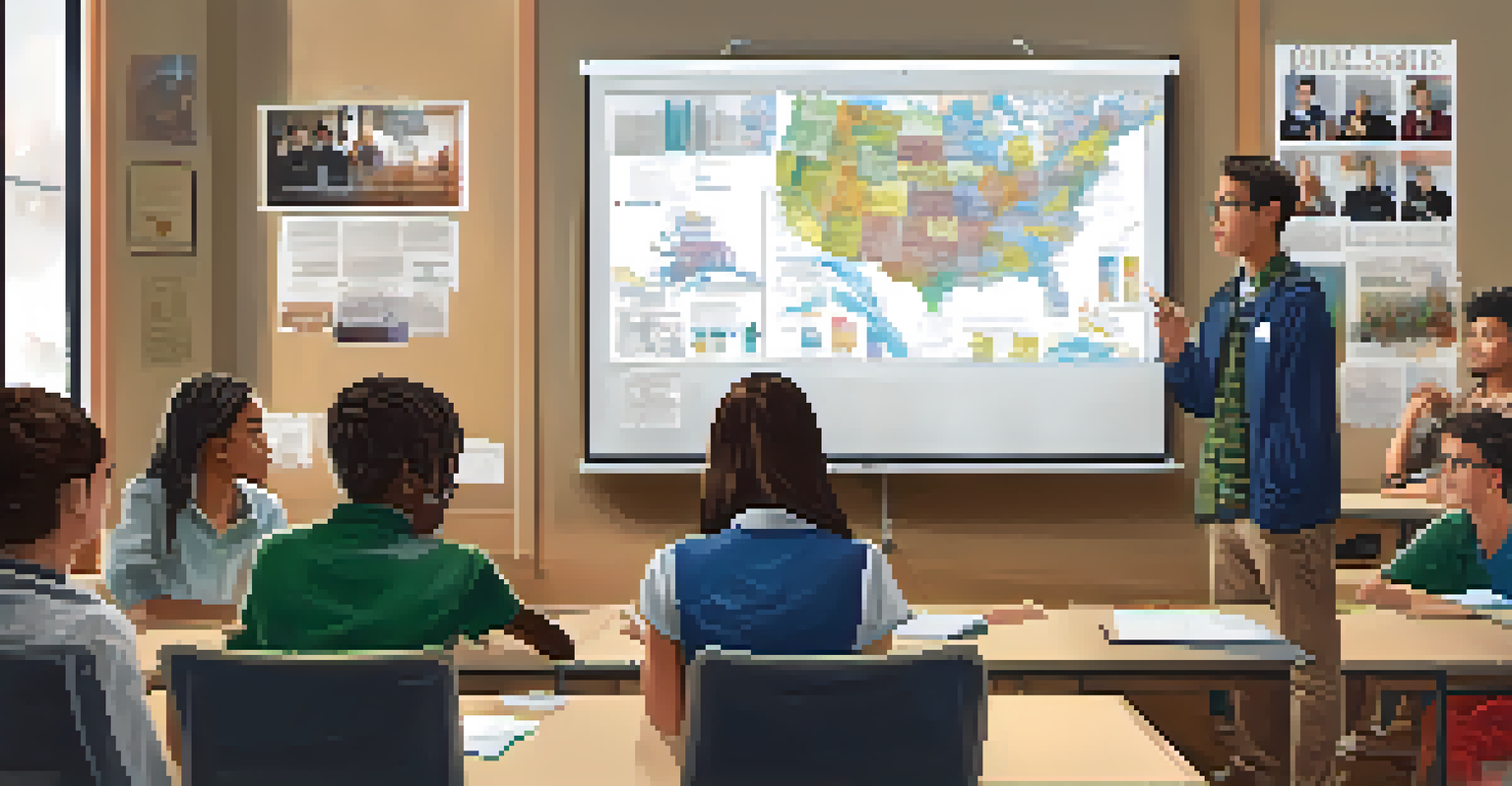Encouraging Critical Discussions in Online Learning Spaces

Understanding the Importance of Critical Discussions
Critical discussions in online learning are essential for deep understanding. They enable students to explore different perspectives and engage with the material on a deeper level. When learners share their thoughts, they not only solidify their knowledge but also build a community of inquiry.
The art of conversation is the art of hearing as well as of being heard.
These discussions help develop critical thinking skills, which are vital in today's fast-paced world. By analyzing and debating ideas, students learn to evaluate information critically and articulate their viewpoints. This process fosters a more enriching learning experience that goes beyond rote memorization.
Furthermore, engaging in discussions can boost confidence in students. As they express their thoughts and defend their opinions, they become more comfortable sharing in a group setting. This sense of belonging can enhance overall motivation and commitment to their studies.
Creating an Inclusive Online Learning Environment
An inclusive environment is key to fostering critical discussions. It encourages all students to share their thoughts without fear of judgment. To achieve this, educators should establish ground rules that promote respect and open-mindedness during discussions.

Incorporating diverse voices is also crucial. By integrating materials and perspectives from various backgrounds, educators can create a rich tapestry of ideas. This not only broadens students' horizons but also allows them to relate to the content on a personal level.
Critical Discussions Foster Understanding
Engaging in critical discussions enhances students' understanding by allowing them to explore diverse perspectives and articulate their viewpoints.
Additionally, using icebreakers and group activities can help build rapport among students. When learners feel connected, they are more likely to engage in discussions. This sense of community encourages participation and cultivates a safe space for exploring complex ideas.
Utilizing Technology for Enhanced Discussions
Technology plays a vital role in facilitating discussions in online learning. Discussion forums, video conferencing, and collaborative tools can enhance interaction among students. These platforms allow for asynchronous and synchronous dialogue, catering to different learning styles.
Critical thinking is the key to creative problem solving in business.
For instance, discussion boards enable students to reflect on their thoughts before sharing, which can lead to more thoughtful contributions. Meanwhile, live chats and video discussions can create a dynamic environment where immediate feedback and engagement occur. Both formats have their own benefits and can complement each other effectively.
Moreover, educators can leverage multimedia resources to stimulate discussions. Videos, articles, and podcasts can serve as conversation starters, prompting students to analyze and critique the content. This varied approach keeps discussions fresh and engaging.
Encouraging Open-Ended Questions
Open-ended questions are excellent tools for promoting critical discussions. Unlike simple yes or no questions, these prompts invite students to think deeply and articulate their views. For example, asking 'What do you think about...' encourages students to explore their thoughts more extensively.
Instructors can model this by starting discussions with thought-provoking questions related to the course material. This sets the tone for deeper inquiry and encourages students to build on each other's responses. As a result, students learn to appreciate the complexity of issues and develop their analytical skills.
Inclusive Environments Promote Participation
Creating an inclusive online learning environment encourages all students to contribute, fostering a sense of community and enhancing engagement.
Moreover, fostering a culture of curiosity can lead to richer discussions. When students feel comfortable asking questions, it opens the floor to diverse viewpoints and collaborative learning. This environment nurtures critical thinking and helps students become more engaged learners.
Incorporating Peer Feedback Mechanisms
Peer feedback is an invaluable component of online discussions. It allows students to reflect on their contributions and learn from one another. By providing constructive feedback, learners develop critical evaluation skills that are essential for academic growth.
Encouraging peer review processes can also promote accountability. When students know their work will be evaluated by their peers, they are more likely to engage thoughtfully in discussions. This sense of responsibility enhances the quality of interactions and fosters a collaborative learning environment.
Additionally, incorporating guided feedback sessions can enrich the experience. Educators can teach students how to give and receive feedback effectively, which can lead to more meaningful conversations. This practice not only improves critical thinking but also strengthens community ties.
Facilitating Structured Debates and Discussions
Structured debates offer a fantastic way to engage students in critical discussions. By assigning roles and viewpoints, students are encouraged to see issues from multiple angles. This format promotes deeper understanding and enhances critical thinking.
Instructors can introduce topics relevant to the course and divide students into groups to prepare their arguments. This preparation allows for thorough exploration of ideas, making the debate more engaging. Furthermore, it encourages students to research and gather evidence to support their claims.
Technology Enhances Learning Interactions
Utilizing technology like discussion forums and video conferencing facilitates dynamic interactions, catering to various learning styles and stimulating deeper conversations.
After the debate, a reflection session can help consolidate learning. Students can discuss what they learned and how their perspectives may have shifted. This process not only reinforces their understanding but also emphasizes the value of diverse viewpoints.
Evaluating the Impact of Discussions on Learning Outcomes
Evaluating the effectiveness of discussions is crucial for continuous improvement. By assessing student engagement and learning outcomes, educators can identify areas that need enhancement. This evaluation can be done through surveys, feedback forms, or reflective essays.
Tracking participation in discussions can also provide insights into students' learning journeys. By analyzing contributions, instructors can gauge which topics resonate most and which require further exploration. This data can inform future course design and discussion topics.

Moreover, celebrating successful discussions can motivate students to participate more actively. Highlighting key contributions and showcasing exemplary discussions fosters a culture of recognition and encourages learners to engage more deeply in future discussions.